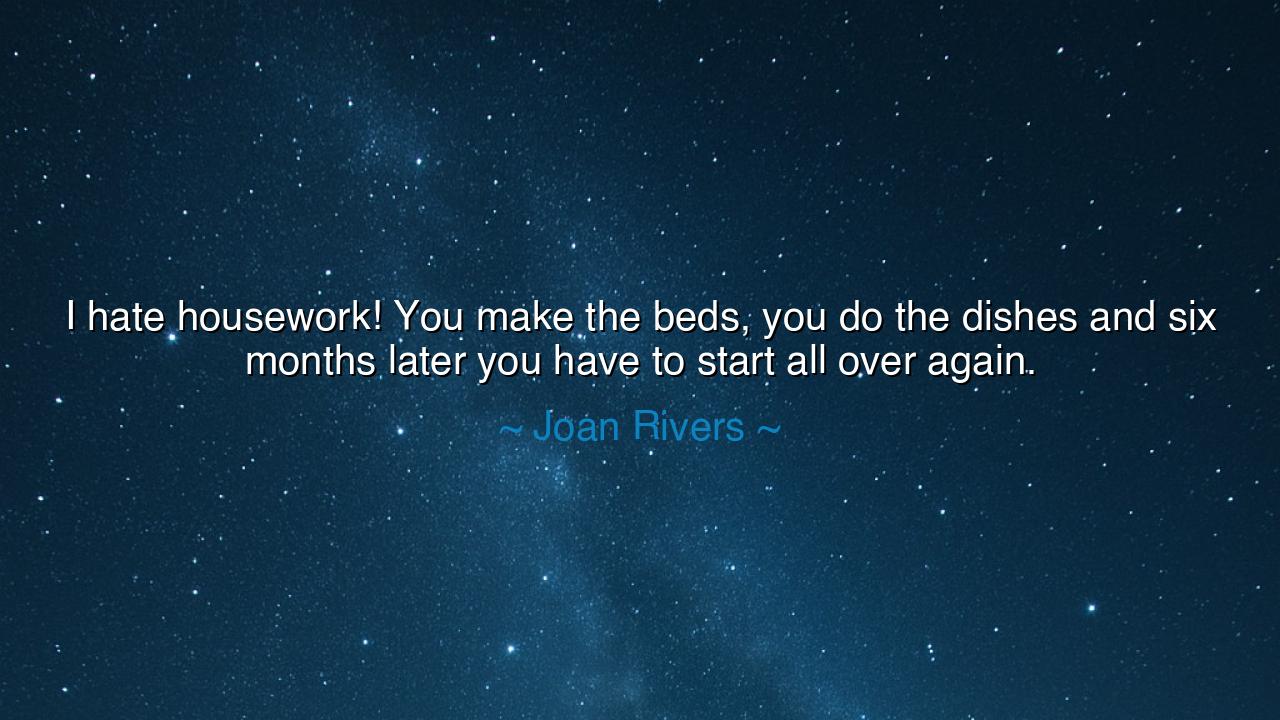
I hate housework! You make the beds, you do the dishes and six
I hate housework! You make the beds, you do the dishes and six months later you have to start all over again.






“I hate housework! You make the beds, you do the dishes, and six months later you have to start all over again.” Thus quipped Joan Rivers, a queen of wit whose laughter was both sword and shield. Her words sparkle with humor, yet behind them lies a truth as ancient as toil itself — that much of life is built upon repetition, upon the endless cycle of effort and renewal. Beneath her jest, we hear not merely the complaint of housework, but the weary sigh of all humanity, bound to the rhythm of daily labor, forever cleaning, building, maintaining, and then beginning again.
In the ancient days, the poets spoke often of cycles — the rising and falling of the sun, the sowing and reaping of the fields, the waxing and waning of the moon. Even the gods, it was said, could not escape the turning wheel of time. The housework of which Rivers speaks is not merely the washing of dishes or the making of beds — it is the symbol of life’s endless maintenance, the constant tending of what is mortal. The floors we clean will gather dust again; the bodies we feed will hunger once more. Yet, within this cycle lies the quiet nobility of endurance — the courage to begin again though we know it will never end.
Joan Rivers, with her sharp humor, transformed the burden of the ordinary into laughter. Her “I hate housework” was not a cry of defeat, but a song of defiance. It was the eternal human protest against futility — the refusal to let routine crush the spirit. By mocking the monotony, she mastered it. Like Sisyphus pushing his stone up the mountain, she made her laughter the act that turned drudgery into art. Her wit teaches us that the power of humor can sanctify even the smallest labors, if only we see them with irony and grace.
Consider the story of the Japanese tea masters, who would spend their lives perfecting the act of preparing tea — boiling water, folding cloth, wiping bowls — gestures repeated thousands of times. To the untrained eye, their actions seemed as meaningless as washing the same dishes again and again. Yet through that repetition, they discovered beauty in constancy. They found that meaning does not always come from novelty, but from devotion. The same act, done with awareness, becomes meditation. Perhaps, then, even the making of a bed — if done with love — is a form of prayer.
Still, Rivers’ laughter reminds us that one need not romanticize every routine. To acknowledge the tedium of repetition is also to be honest about the human heart. We crave progress, change, and reward — and yet much of life is maintenance. The kitchen never stays clean; the workday never ends. But here lies the secret wisdom: life is not meant to be finished. It is meant to be lived. The dishes exist so that we may eat; the bed, so that we may rest and dream. The value lies not in their permanence, but in the comfort they give us along the way.
From this, we learn that the measure of our days is not in grand achievements alone, but in the faithful repetition of small acts. To sweep, to cook, to tend, to clean — these are not meaningless labors, but the quiet rituals that hold civilization together. The humor of Joan Rivers, therefore, becomes a deeper truth: that even in monotony, there is dignity. And when laughter joins our labor, the burden lightens.
So, dear reader, when you too feel the weariness of starting over — when your life feels like a pile of undone chores — remember this: the eternal rhythm is not your enemy, but your teacher. Learn to smile at the repetition. Find beauty in your small beginnings. For in the endless doing and redoing lies the proof that you are still alive, still striving, still part of the great circle of creation. Laugh as Joan Rivers laughed, not because the work ends, but because you have the spirit to begin again.
Thus, her jest becomes wisdom: life will always demand that you start over — but joy is found in the courage to do it, and in the laughter that makes the task lighter.






AAdministratorAdministrator
Welcome, honored guests. Please leave a comment, we will respond soon